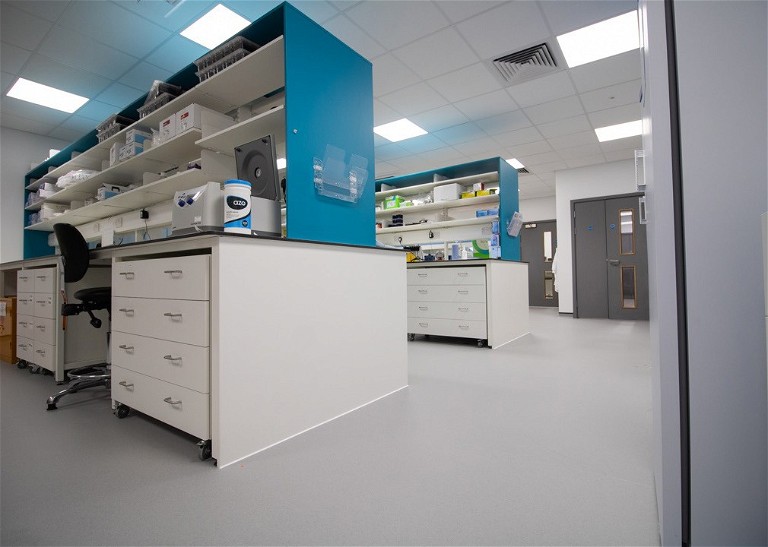Discovery and development: genomics testing
How public/private partnerships in genomics are streamlining patient pathways and delivering value
Since the completion of the Human Genome Project in 2003, there has been huge growth in the utilisation of genomics, but how can partnerships in this area be used to improve patient experience
Simon Davis at Informed Genomics
IPT: What value does genomic testing provide for healthcare systems, patients and wider society?
Simon Davis (SD): Since the completion of the Human Genome Project in 2003, there has been huge growth in the use of genomics to transform the lives of patients. One significant benefit has been the enablement of early disease detection, with genetic tests identifying disease risk factors before symptoms appear, leading to more timely interventions and better outcomes. This allows patients insights into their genetic predispositions, innately empowering them to make more informed choices about their lifestyle, preventative measures, family planning and more.
More broadly speaking, genomic testing has become a standard practice in many disease areas, particularly for identifying rare diseases, optimising cancer treatments and in prenatal and neonatal screening programmes. In terms of precision diagnostics, genomic testing can enhance diagnostic accuracy, leading to more targeted treatments and reducing unnecessary procedures, hospitalisations and costs. The use of genomics has increased a great deal in recent years, with the number of marketed personalised medicines increasing from 132 in 2016 to 236 in 2020. Another example of its use is better stratification of patient populations for personalised medicine. Genomic testing allows medical treatments to be tailored to an individual based on their genetic makeup, improving treatment efficacy and reducing adverse effects.
By understanding genetic variations, healthcare systems can develop targeted public health initiatives, including preventative measures, disease surveillance and tailored interventions. During the COVID-19 pandemic, the power of advanced diagnostics was put to the test from a public health perspective. Between March 2020 and February 2022, the UK sequenced over two million SARS-CoV-2 genomes, using this data to inform local, national and international policy decisions and contributing to the curbing of viral spread.
In terms of research and innovation, genomic data can contribute to many scientific advancements, as well as drug development and understanding disease mechanisms. It also expands the industry’s understanding of human biology, evolution and disease, which, as a result, benefits society through informing policies, education and ethical discussions. Economically speaking, genomics also drives innovation, creating a wealth of jobs within the research, healthcare and technology sectors, as well as attracting additional investment and fostering economic growth.
IPT: What are the key challenges in access to genomic testing in the UK, and what solutions do you think could address these challenges?
SD: Currently, there are seven key challenges to accessing genomic testing in the UK, spanning workforce capacity to health inequalities and cost.
1. Workforce capacity and training
The first challenge encountered in this area is a lack of trained and available clinicians and scientists to seek patient consent, interpret genomic findings and communicate results. However, upskilling in all areas of the NHS could solve this; providing more staff with additional education on genomic testing and sharing results is a step in the right direction.
2. Infrastructure and coordination
Another challenge is the absence of a coordinated infrastructure to support the standardised delivery of genomic testing. There are also administrative burdens in gaining patient consent and ordering sufficient relevant tests. Developing a robust digital infrastructure to streamline these consent and test ordering processes could be a solution.
3. Mainstreaming genomics (integration into routine practice)
Some view the mainstreaming of genomics as politically driven rather than clinically necessary, although this could easily be combatted by engaging healthcare professionals and emphasising the clinical benefits of genomics.
4. Health inequalities
There is a real challenge in ensuring equal and equitable access to genomics testing across diverse populations, requiring tailored sequencing from different backgrounds, community engagement and a push to build trust with groups who have traditionally been excluded from prior areas of research.
5. Cost efficiency
Implementing the required infrastructure for genomic testing can be expensive, and the costs continue to rise. However, the investment can be considered worth its cost, as genomic tests are part of the solution in many ways and can improve efficacy by providing accurate diagnoses and more targeted treatments.
6. Capacity and expertise
There are large backlogs and waiting lists within the NHS, meaning large volumes of patients need hospital diagnostic procedures. However, adopting more agile solutions, outsourcing to private providers and implementing more non-invasive tests could help. An anonymous senior consultant stated that “non-urgent” patients who had their blood sent for sequencing at one of the UK’s largest hospitals could face a wait of more than three years, based on the current turnaround times combined with a backlog of approximately 700 cases, commenting that “The system is in crisis for routine testing.”
7. Current value assessment models
There is currently a low incentive to access new technology, with a positive value assessment outcome not linked to the decision to reimburse for the test. However, this could be combatted by creating accessible pilot evaluation schemes, creating evidence and working in tandem to find the best approaches to its implementation.
IPT: What are the key benefits that public/private partnerships can bring in genomics to research and innovation and access to resources and expertise?
SD: Public-private partnerships play a crucial role in advancing research and innovation, bringing together stakeholders from all sectors, including government, academia, industry and patient advocacy groups. Some of the benefits of these partnerships include addressing bottlenecks in research and development by aligning the partners’ efforts, providing a means for various NHS Trusts to access new technologies, speeding up national commissioning decisions, and supporting faster access for patients. The evidence generated through adopting novel genomics technologies on a pilot supports a downstream value assessment and evidence-based decision-making for adopting new tests. Additionally, partnerships can provide a cornerstone for establishing new infrastructure within the NHS, with companies able to provide the capacity and capabilities that would be far too resource-intensive for individual NHS Trusts and laboratories to develop individually.

Regarding research, partnerships can drive the establishment of regulatory standards, ensuring research adheres to quality and safety guidelines and helping reduce costs by sharing resources and expertise across organisations, leading to more efficient research. They also allow for economies of scale – by pooling resources, such as data, infrastructure and funding, researchers can achieve more significant impact and accelerate their discoveries. Finally, they can facilitate faster progress through combined expertise, enabling researchers to collaborate on complex health challenges, leading to medical breakthroughs for patients.
IPT: How can public/private partnerships in genomics bring benefits to data sharing and integration, policy change, infrastructure and access to services?
SD: Data sharing:
Collaborations between public and private entities, such as Genomics England, enable all parties to access and share largescale genomic data. This integrated data approach allows more researchers to explore new hypotheses and accelerate their discoveries. Research institutions’ partnerships with commercial cloud providers – such as Amazon, Microsoft and Google – allow them to handle massive volumes of genomic data, reducing the overall cost to the system.
Policy:
Transparency and solidarity are essential in this area. Partnerships should transparently prioritise the healthcare challenges the industry faces and the public benefit this will bring, over commercial interests.
Access:
The sharing of genomic data enables the development of personalised medicine, such as tailoring treatments based on an individual’s genetic makeup. Partnerships often focus on rare genetic diseases, where commercial development may not be viable, meaning treatments may be discovered for indications that would otherwise have been overlooked. In terms of public health surveillance, genomics contributes to the surveillance of diseases, allowing for more timely responses to various diseases.
In summary, public-private partnerships facilitate collaboration, resource sharing and policy advocacy, ultimately benefiting genomic research, healthcare and patient outcomes.
IPT: What is the impact of costs and risks?
SD: While public-private partnerships benefit from shared resources, ensuring equitable returns to the public sector can be challenging. It is crucial to ensure commercial interests are balanced fairly with public benefit. Collaborations with commercial entities could also impact public trust. Therefore, safeguards are necessary to protect patients and avoid prioritising profits over robust governance structures. Similarly, there are some ethical issues to consider. Public-private partnerships can raise questions around data ownership, privacy and transparency, so striking the right balance is essential.
The minimum requirements for these partnerships are that they should contribute to public benefit, as prioritising public interests over commercial gains is essential. They should also ensure robust governance, as avoiding the prioritisation of commercial interests requires strong governance structures, where transparency and accountability are vital. Partnerships must ensure that the benefits reach all, especially marginalised groups.
To summarise, the broader implementation of genomics in research and clinical practice will continue to drive more targeted treatments for patients and improve health outcomes. This will also aid healthcare systems in improving disease surveillance and preventative measures and developing tailored interventions.
Public-private partnerships will be crucial in leveraging both sectors’ strengths, as a joint effort will be required to trigger faster research breakthroughs, the development of innovative treatments and more personalised healthcare. These partnerships will also mean access to much larger data sets, enabling better insights and additional discoveries; however, balancing commercial interests with public benefit is crucial, and specific safeguarding measures are required to protect patients, maintain public trust and prioritise societal well-being.

Simon Davis developed his career within global pharmaceutical companies in commercial leadership roles before moving to a clinical genomics company as commercial director in 2018. He joined Informed Genomics as commercial director in May 2023 and became chief executive officer in January 2024. Simon has vast experience and a proven track record of commercial success within the life sciences and MedTech industries over the past 20 years and covers genomic testing, enabling earlier diagnosis, personalised treatments and improved patient outcomes.